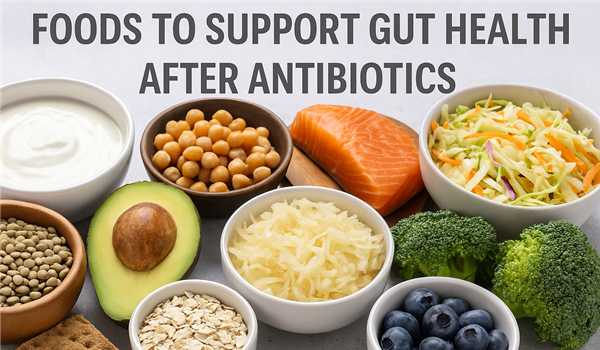Gut Heath after antibiotics nutrition

Patient Information Leaflet: Foods for a Healthy Gut After Antibiotics
Kensington Medical Centre – Belfast
⸻
Why Gut Health Matters
Your gut is home to trillions of bacteria, known as the gut microbiome. These bacteria help with digestion, support your immune system, and even influence mood and energy levels.
Antibiotics, while important for fighting infections, can disrupt the balance of these bacteria. Eating the right foods after antibiotic treatment can help restore and support a healthy gut.
⸻
Goals After Antibiotic Use
• Rebuild beneficial gut bacteria
• Reduce bloating and digestive discomfort
• Support your immune system
• Promote overall health
⸻
Gut-Friendly Foods to Include
1. Probiotic-Rich Foods
Contain live beneficial bacteria that help replenish your gut microbiome.
Examples:
• Live yoghurt (look for “live cultures” on the label)
• Kefir (a fermented milk drink)
• Sauerkraut, kimchi (fermented vegetables)
• Miso (fermented soy paste)
• Tempeh (fermented soy product)
2. Prebiotic Foods
Feed the good bacteria and help them grow.
Examples:
• Bananas (especially slightly green)
• Onions, leeks, garlic
• Asparagus, Jerusalem artichokes
• Oats, apples, barley
3. High-Fibre Foods
Support regular digestion and encourage the growth of healthy gut bacteria.
Examples:
• Wholegrains (brown rice, wholemeal bread, oats)
• Beans and lentils
• Nuts and seeds
• Fruits and vegetables (especially with skins)
4. Polyphenol-Rich Foods
Help nourish good bacteria and reduce inflammation.
Examples:
• Berries, dark chocolate (in moderation), green tea
• Olive oil, coffee (if tolerated), red grapes
⸻
Hydration and Digestive Health
• Drink plenty of water to help with digestion and prevent constipation.
• Herbal teas like peppermint or chamomile can soothe the digestive system.
⸻
Foods to Limit
• Highly processed foods – often low in fibre and can upset gut balance
• Sugary foods and drinks – may promote harmful bacteria
• Excess alcohol – can damage the gut lining and reduce good bacteria
• Artificial sweeteners – may affect gut bacteria in some people
⸻
Helpful Tips
• Reintroduce fibre-rich foods gradually if you’ve had digestive upset
• Eat a variety of plant-based foods each week (aim for 30 different types)
• Choose plain live yoghurt over sugary varieties
• Cook from scratch when possible, to avoid additives and preservatives
• Avoid taking unnecessary antibiotics – always follow your GP’s advice
⸻
When to See a Doctor
Contact your GP if you:
• Have ongoing diarrhoea, bloating, or stomach pain after antibiotics
• Experience blood in your stool or unplanned weight loss
• Have concerns about diet or digestion
• Want advice on probiotics or prebiotic supplements
⸻
For more information, visitwww.nhs.uk/conditions/digestive-health
This leaflet is for general information only. Please speak to your healthcare provider for advice specific to you.
Medical Disclaimer
The dietary advice and information provided in this leaflet are for general guidance and educational purposes only. They are not intended to replace personalised advice, diagnosis, or treatment from a qualified healthcare professional.
If you have a medical condition, are taking medication, are pregnant or breastfeeding, or have specific dietary needs or food allergies, you should consult your GP, dietitian, or another healthcare provider before making significant changes to your diet.
Following general dietary recommendations without proper medical supervision may not be suitable for everyone and could result in unintended health effects. Always seek individualised medical advice for your personal health circumstances.
Page created: 01 June 2025